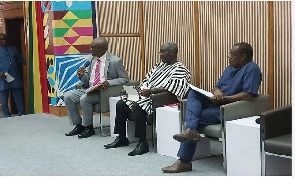 Some members of the the National Development Planning Commission (NDPC)
Some members of the the National Development Planning Commission (NDPC)
The National Development Planning Commission (NDPC) says the constitutional requirement for all newly elected Presidents to prepare a coordinated programme at all levels is affecting the continuity of existing national development plans.
The Commission said whereas Article 87 (2) of the 1992 Constitution mandates the NDPC to develop long and medium-term plans for the country, Article 36 (5) of the same Constitution enjoined the President to present to Parliament a coordinated programme of economic and social development policies at all levels in all the regions within two years after assuming office.
In an interview with the Ghana News Agency at a Technical Consultative Meeting in Accra on Wednesday, Dr Kodjo Mensah-Abrampa, Director-General, NDPC, said the two constitutional provisions were not complimentary.
He said the law must be specific on the processes required to ensure that the President complied with existing national development plans.
“Whether there is a plan or not, the President has to develop that (plan) and it did not indicate the process of the preparation. So, a president can decide that I would do this besides the planning process, there is nothing, which can prevent that.
“If the President decides that I will be guided by the plan, it is voluntary,” Dr Mensah-Abrampa said.
The NDPC and the African Centre for Economic Transformation (ACET) are pushing for reforms to make national development plans binding on successive governments.
The two institutions are spearheading a Compact for Ghana’s Political and Economic Transformation, which will set agreed goals and targets for the country’s governance, political processes, economic management and policies for inclusion in the second quarter of the 21st Century.
The Compact is expected to set a long-term vision for economic transformation and a strong system that would compel leaders to stick to existing national development plans and champion coordinated development.
Dr Mensah-Abrampa said the current constitutional arrangement made the Commission an advisory body because the plans it prepared were not binding on the President.
He said there was the need to legitimise national development plans as well as review the Constitution to lift the approval process of all plans by the NDPC to Cabinet and Parliament.
“This whole process is to bring back the owners of these plans; awake citizens…the fundamental thing is that the plans are owned by the citizens and the citizens protect the plan,” he said.
Dr Kingsley Y. Amoako, Founder and President of ACET, said the Constitution was one of the key areas of focus, adding that the Compact would provide a plan and roadmap for reforms.
“The consultation is part of broader effort to build consensus for long-term success,” he said.
Professor Ernest Aryeetey, a former Vice-Chancellor of the University of Ghana, said the appointment and election of leaders must be based on their long-term commitments.
“You can strengthen the NDPC, but if the President does not believe in the Commission, nothing will happen,” he said.